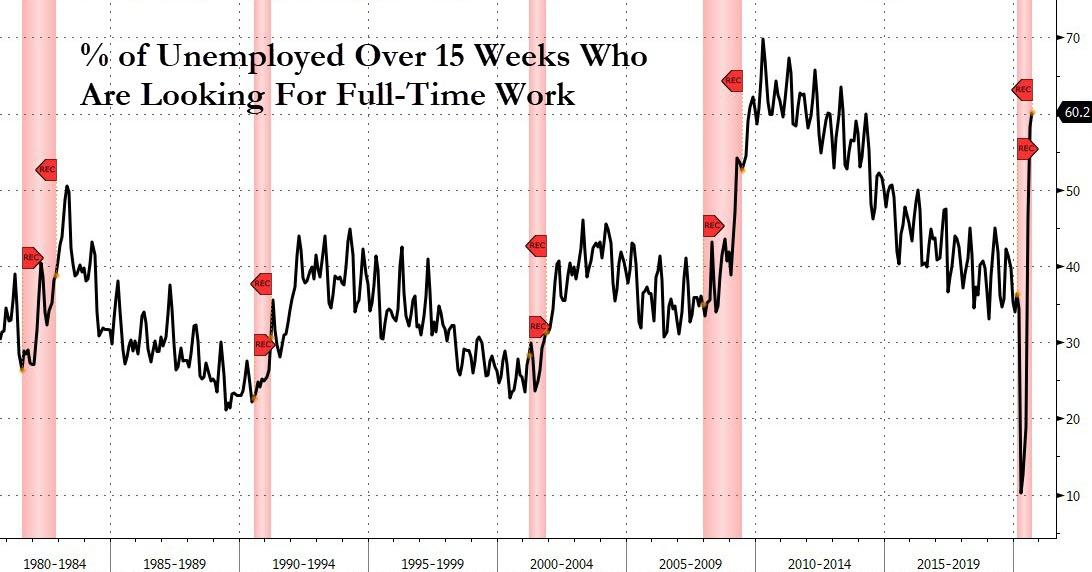Ranks Of The Long-Term Unemployed Growing
Tyler Durden
Mon, 10/26/2020 – 12:15
The mainstream spin on unemployment is that things are improving. The unemployment rate is coming down. The number of weekly jobless claims recently fell below 800,000 for the first time since government lockdowns in response to the pandemic went into high gear last March. But there are some troubling signs that undercut this good-news narrative. The number of long-term unemployed workers is steadily rising.
The ranks of the long-term unemployed – those out of work for 27 weeks or more – grew to 2.4 million in September, according to Bureau of Labor Statistics data. That’s the highest number since the beginning of the pandemic. The last time we saw this kind of jump in long-term unemployment was during the Great Recession.
Meanwhile, the number of Americans out of work for 15 weeks to 26 weeks stands at 5 million.
To put the growing number of long-term unemployed workers into some historical context, long-term unemployment hit a record high of 6.5 million and made up 44% of all unemployed workers in March 2010. That was 10-and-a-half months after the official end of the Great Recession in the summer of 2009. Long-term unemployed workers already make up 20% of the total unemployed just 8 months after the US economy fell into recession.
“You had all these people who were long-term unemployed in the Great Recession, they trickled in,” Martha Gimbel, an economist and labor market expert at Schmidt Futures, told CNBC.
“But this is all hitting at once.”
Roughly 13.5 million Americans currently collect benefits under the various federal unemployment programs that expire at the end of 2020.
According to the August Job Opening and Labor Turnover Summary, there are roughly two unemployed people for every open job.
This data dovetails with our recent report that many “temporary” layoffs are becoming permanent job losses. According to the Bureau of Labor Statistics, the number of job losses categorized as permanent grew by 345,000 to 3.8 million people in September. In other words, nearly 4 million people laid off by small businesses during the pandemic have no jobs to go back to.
There are plenty of signs that the job market won’t improve in the near future. Some states and cities are locking things down again as coronavirus cases rise. Regal Cinemas closed all of its locations earlier this month with no timetable for reopening. Disney announced plans to lay off 28,000 workers. US airlines are shedding jobs at a dizzying pace.
In a recent podcast, Peter Schiff said he thinks a lot of the people who have gone back to work in recent weeks will eventually find themselves in the unemployment line again.
I think a lot of these people who have been recalled, who have come back to work, I think ultimately their employers are going to realize, after the fact, that they don’t really need a lot of these workers, and a lot of these workers are going to be re-fired. Except next time it is going to be permanent, not temporary.”
There is also the looming prospect of more corporate bankruptcies and business closures, putting more pressure on the jobs market. More than 420,000 small businesses have closed their doors permanently since the beginning of the pandemic. That represents a staggering 7.1% of all small businesses. Brookings estimates that the US economy has lost some 4 million jobs in the small business sector “that will only return with the creation of new businesses.” On top of all this, Goldman Sachs projects even more permanent job losses coming down the pike as a wave of mergers, acquisitions and corporate takeovers sweeps through the economy.
Lockdowns and the government/central bank response to the ensuing economic fallout may have permanently scarred the labor market and there are signs of deep wounds that won’t quickly heal. In a nutshell, a lot of people will likely never return to work.
via ZeroHedge News https://ift.tt/3opb7mJ Tyler Durden

